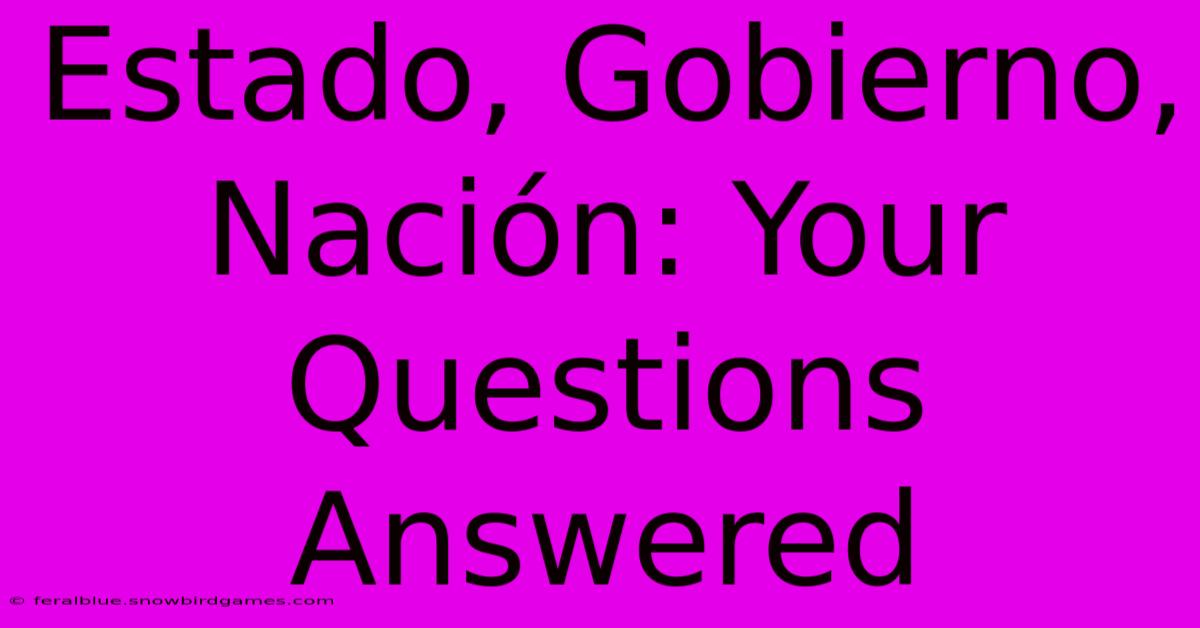Estado, Gobierno, Nación: Your Questions Answered

Table of Contents
Estado, Gobierno, Nación: Your Questions Answered
Understanding the differences between estado, gobierno, and nación can be tricky, even for native Spanish speakers. These three terms are often used interchangeably, leading to confusion. This article will clarify the distinctions between these key concepts, answering common questions and providing a clear understanding of their interconnected yet separate roles.
What is an Estado (State)?
The estado, or state, refers to the political entity itself. It's the permanent structure encompassing a defined territory, a population, and a sovereign government. Think of it as the legal framework within which a society operates. Key characteristics of an estado include:
- Sovereignty: The state holds supreme authority within its territory, free from external control.
- Territory: A clearly defined geographical area under the state's jurisdiction.
- Population: A group of people residing within the state's territory, subject to its laws.
- Government: An organized system for exercising authority and governing the population. (Note: This is different from the gobierno itself.)
In short: The estado is the entity; the building, if you will.
What is a Gobierno (Government)?
The gobierno, or government, is the group of people who exercise power within the state. It's the organizing body responsible for enacting and enforcing laws, managing public services, and representing the state in its dealings with other states and international organizations. This is the temporary administration of the state. Importantly:
- Governments change: The gobierno can be replaced through elections or other constitutional means. The estado, however, remains constant.
- Structure varies: The structure of the gobierno can vary greatly depending on the political system (e.g., presidential, parliamentary, etc.).
- Functionality: Its main function is governance—the implementation of the state's policies and laws.
In short: The gobierno is the team managing the building.
What is a Nación (Nation)?
The nación, or nation, is a group of people who share a common identity. This identity can be based on various factors, including:
- Shared culture: Common language, traditions, customs, and values.
- Shared history: A collective past and narrative that binds the people together.
- Shared territory (often, but not always): While a nation often occupies a specific geographical area, this isn't always the case. A nation can exist without its own state (a stateless nation).
- Shared sense of belonging: A feeling of collective identity and unity.
The relationship between a nación and an estado can be complex. Sometimes, a nation perfectly aligns with a state (e.g., Japan). Other times, a nation may span multiple states (e.g., the Kurds) or a state may contain multiple nations (e.g., Canada).
In short: The nación is the community that may or may not inhabit the building.
The Interplay of Estado, Gobierno, and Nación
These three concepts are intertwined but distinct. The estado provides the legal framework, the gobierno manages the state's affairs, and the nación represents the shared identity of the people. Understanding their differences is crucial to comprehending the complexities of political systems and the dynamics of power. A strong estado needs a stable gobierno and is often (but not always) rooted in a unified nación. However, the absence of a unified nación does not automatically weaken the estado.
Frequently Asked Questions (FAQs)
Q: Can a nation exist without a state? A: Yes, a nation (a group of people with a shared identity) can exist without its own state (political entity). The Kurds are a prime example of a stateless nation.
Q: Can a state exist without a nation? A: Yes, although less common. A state might encompass diverse groups of people who don't share a common national identity.
Q: What happens if the government collapses? A: The gobierno can be overthrown or replaced, but the estado (the political entity) itself may continue to exist, even if in a weakened or unstable form. A new gobierno will eventually be formed.
This article aims to offer a clear explanation of the intricate relationship between estado, gobierno, and nación. Understanding these distinctions is essential for navigating the political landscape and analyzing societal structures effectively.

Thank you for visiting our website wich cover about Estado, Gobierno, Nación: Your Questions Answered. We hope the information provided has been useful to you. Feel free to contact us if you have any questions or need further assistance. See you next time and dont miss to bookmark.
Featured Posts
-
David Millers Daughter The Road To Healing
Apr 02, 2025
-
Janhvi Kapoors Style Inspired By Sridevi
Apr 02, 2025
-
Age Related Blood Pressure Changes What To Do
Apr 02, 2025
-
Thelma Madines Daughter A Legacy Unveiled
Apr 02, 2025
-
Jodi On Mom Encouraging Creativity In Kids
Apr 02, 2025
